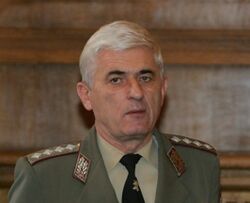Petar Tomulevski
Petar Tomulevski | |
|---|---|
 Tomulevski in 2008 | |
| Born | 18 October 1952 Zovahr, Syara |
| Died | 26 February 2009 (aged 56) Southern Ruvelka |
| Allegiance | |
| Service/ | Army of the Syaran Republic Syaran National Army |
| Years of service | 1974-2008 |
| Rank | Colonel General |
| Unit | 8th Army |
| Battles/wars | Refusal War Zemplen War |
| Awards | see below |
Petar Tomulevski (Born 10 October, 1952, died 26 February, 2009) was a Syaran general best known for commanding 8th Army of the Syaran National Army during the Zemplen War.
An ethnic Makedonian, Tomulevski was born in Zovahr and was commissioned into the Army of the Syaran Republic. He defected to the Wardens during the Refusal War, and afterwards was commissioned into the Syaran Commonality Armed Forces in 1988. Tomulevski served in a variety of divisional and administrative commands until he was promoted to the command of II Corps just prior to the Imerti Conflict. Tomulevski was promoted to Colonel General upon the outbreak of the Zemplen War and given command of 8th Army as part of Army Group Gamma in southern Ruvelka. Following the Ruvelkan Winter Counter-Offensive in late 2008, he directed Syaran forces along the Matra Mountains at the start of 2009. During this time he laid the ground work for the Operation Synaspismos, which was launched on 18 February 2009.
On 28 February Tomulevski was killed by Ruvelkan special forces while he was monitoring the advance of his forces during the fighting. Tomulevski's death came as a surprise to Syaran Central Command, and was replaced by Emanuel Bilić as 8th Army commander. Rumors have persisted since the war that his death was accomplished with assistance, either direct or indirect, by the Mansuri armed forces, an accusation that neither the Ruvelkan nor Mansuri government have confirmed nor denied.